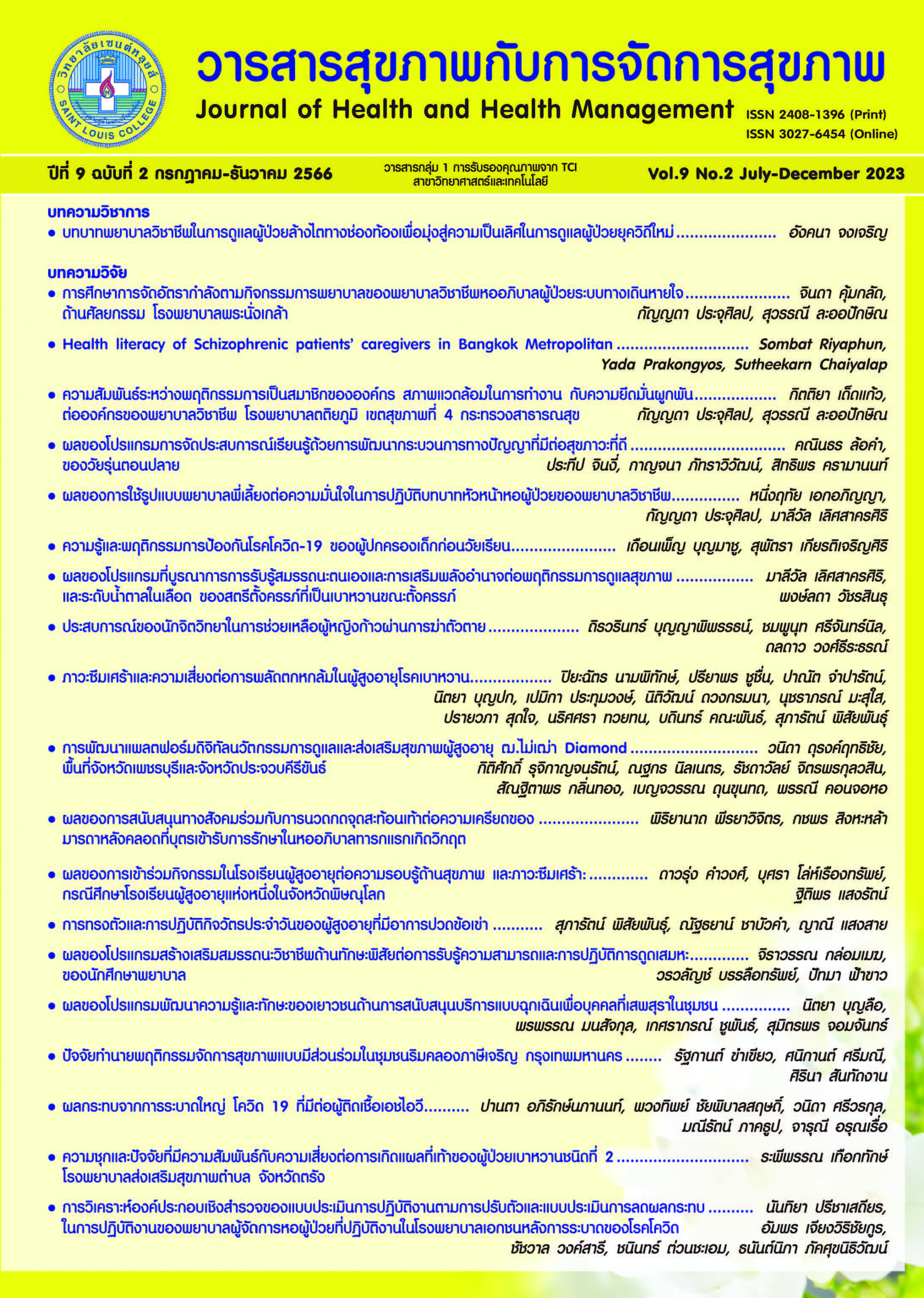The Impact of the COVID-19 Pandemic on People with HIV
Keywords:
HIV people, impact of pandemic COVID 19Abstract
This descriptive research, objectives were studied effect of pandemic COVID 19 on HIV people. There are physical dimension, knowledge, anxiety, self-care, and correlation between age, infected years, social support, income, number of physician visiting, anxiety of pandemic COVID 19, and self-care on HIV people. The sample was 104 of HIV people who has treatment at public hospital. Sampling by chance. The instruments were used in this study, there were an instrument from faculty of nursing, University of California, San Francisco and faculty of nursing, John Hopkins University, USA. Statistic was descriptive statistic and Pearson Correlation. Research result: mean age of sample was 44.58 years, infected years average 13.02, they had sex with spouse in the past year 88.5%, visit physician average 3.35 times, by face to face 83.7 %. All of them had gotten the HIV anti-virus, and viral load testing is none and very low 83.7%. Social support was at the good level, anxiety level, and self-care, at the moderate level. From the study, there were 5 pairs of the variable had correlation shown as: 1) age of HIV people positive correlated with infected years at moderate level ,(r= .54, p-value < .01) 2) income had positive correlated with social support at the lower level (r = .23, p-value < .05) 3) infected years positive correlated with number of physician visiting at lower level (r = -.20, p-value < .05) 4) social support positive correlated with self-care of HIV people at the lower level (r = .21, p value < .05) The suggestion from the research for supporting and promoting self-care for HIV people and develop literacy model for promoting self-care of HIV people.
References
กองยุทธศาสตร์และแผนงาน สำนักงานปลัดกระทรวงสาธารณสุข กระทรวงสาธารณสุข. (2562). สถิติสาธารณสุข พ.ศ. 2562. นนทบุรี: กระทรวงสาธารณสุข.
กองโรคเอดส์และโรคติดต่อทางเพศสัมพันธ์ กรมควบคุมโรค กระทรวงสาธารณสุข. (2564). การฉีดวัคซีนโควิด-19 ในผู้ติด เชื้อเอชไอวี/ผู้ป่วยเอดส์. สืบค้นจาก https://www.ddc.moph.go.th/uploads/files/1914020210622071958.pdf
ธนา ขอเจริญพร. (2565). โรคติดเชื้อ HIV และโควิด 19 ปี 2564. สืบค้นจาก https://cimjournal.com/idv-conference/%E0%B9%82%E0%B8%A3%E0%B8%84%E0%B8%95%E0%B8%B4%E0%B8%94%E0%B9%80%E0%B8%8A%E0%B8%B7%E0%B9%89%E0%B8%AD%E0%B9%80%E0%B8%AD%E0%B8%8A%E0%B9%84%E0%B8%AD%E0%B8%A7%E0%B8%B5/
พิชิต วิจิตรบุญยรักษ์. (2554). สื่อสังคมออนไลน์: สื่อแห่งอนาคต. วารสารนักบริหาร, 31(4), 99-103.
องค์การสหประชาชาติ. (2564). องค์การสหประชาชาติ ร่วมภารกิจยุติเอดส์ให้ได้ภายใน ปี 2573. สืบค้นจาก https://workpointtoday.com/unaids/
Aborode, A. T., Olotu, T. M., Oyetunde, O. B., Ajagbe, A. O., Mustapha, M. A., Karra-Aly, A., & Oko, C. I. (2022). COVID-19 outcomes in HIV patients: a review. Annals of Medicine and Surgery, 78, 103768.
Brown, L. B., Spinelli, M. A., & Gandhi, M. (2021). The Interplay between HIV and COVID-19: summary of the data and responses to date. Current Opinion in HIV and AIDS, 16(1), 63–73.
Geretti, A. M., Stockdale, A. J., Kelly, S. H., Cevik, M., Collins, S., Waters, L., ... & Semple, M. G. (2021). Outcomes of coronavirus disease 2019 (COVID-19) related hospitalization among people with human immunodeficiency virus (HIV) in the ISARIC World Health Organization (WHO) clinical characterization protocol (UK): a prospective observational study. Clinical Infectious Diseases, 73(7), 2095-2106.
Jones, D. L., Ballivian, J., Rodriguez, V. J., Uribe, C., Cecchini, D., Salazar, A. S., ... & Alcaide, M. L. (2021). Mental health, coping, and social support among people living with HIV in the Americas: a comparative study between Argentina and the USA during the SARS-CoV-2 pandemic. AIDS and Behavior, 25(4), 2391-2399.
Khamarko, K., & Myers, J. J. (2013). The influence of social support on the lives of HIV-infected individuals in low-and middle-income countries. Geneva : World Health Organization.
Kim, H. Y. (2013). Statistical notes for clinical researchers: assessing normal distribution (2) using skewness and kurtosis. Restorative dentistry & endodontics, 38(1), 52–54.
Mellor, M. M., Bast, A. C., Jones, N. R., Roberts, N. W., Ordóñez-Mena, J. M., Reith, A. J., ... & Dorward, J. (2021). Risk of adverse coronavirus disease 2019 outcomes for people living with HIV. AIDS (London, England), 35(4), F1.
Mohebi, S., Parham, M., Sharifirad, G., Gharlipour, Z., Mohammadbeigi, A., & Rajati, F. (2018). Relationship between perceived social support and self-care behavior in type 2 diabetics: A cross-sectional study. Journal of education and health promotion, 7, 48. https://doi.org/10.4103/jehp.jehp_73_17
Schulz, A. J., Israel, B. A., Zenk, S. N., Parker, E. A., Lichtenstein, R., Shellman-Weir, S., & Ab, L. K. (2006). Psychosocial stress and social support as mediators of relationships between income, length of residence and depressive symptoms among African American women on Detroit's eastside. Social science & medicine, 62(2), 510-522.
The Bangkok Insight Editorial Team. (2565). อัพเดทสถานการณ์โควิด วันที่ 25 มกราคม 2565. Retrieved from https://www.thebangkokinsight.com/news/politics-general/covid-19/792183/.
Weyers, S., Dragano, N., Möbus, S., Beck, E. M., Stang, A., Möhlenkamp, S., ... & Siegrist, J. (2008). Low socio-economic position is associated with poor social networks and social support: results from the Heinz Nixdorf Recall Study. International Journal for Equity in Health, 7(13), 1-7.
Downloads
Published
How to Cite
Issue
Section
License
Copyright (c) 2023 Journal of health and health management

This work is licensed under a Creative Commons Attribution-NonCommercial-NoDerivatives 4.0 International License.




